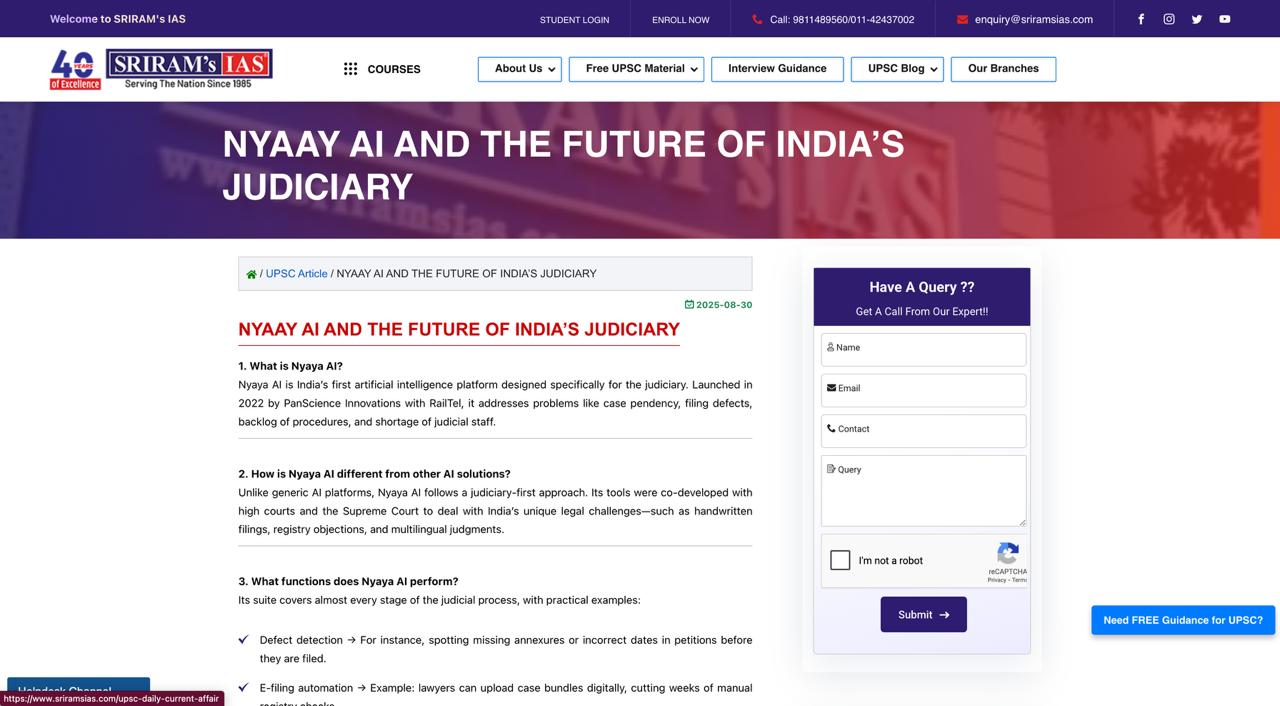Nyaay AI and the Future of India’s Judiciary
By Sriram IAS Editorial Team
August 30, 2025
1. What is Nyaay AI?
Nyaay AI is India’s first artificial intelligence platform designed specifically for the judiciary. Launched in 2022 by PanScience Innovations with RailTel, it addresses problems like case pendency, filing defects, backlog of procedures, and shortage of judicial staff.
2. How is Nyaay AI different from other AI solutions?
Unlike generic AI platforms, Nyaay AI follows a judiciary-first approach. Its tools were co-developed with high courts and the Supreme Court to deal with India’s unique legal challenges—such as handwritten filings, registry objections, and multilingual judgments.
3. What functions does Nyaay AI perform?
Its suite covers almost every stage of the judicial process, with practical examples:
- Defect detection: Spotting missing annexures or incorrect dates in petitions before they are filed.
- E-filing automation: Lawyers can upload case bundles digitally, cutting weeks of manual registry checks.
- Case clustering and allocation: Similar petitions, like multiple PILs on air pollution, can be grouped and assigned to the same bench.
- Metadata extraction: Pulling out case numbers, names, and legal provisions from scanned records.
- Headnote generation: Automatically producing legal summaries of judgments, e.g. “right to privacy as part of Article 21.”
- Live transcription: Real-time speech-to-text during courtroom hearings.
- Judgment translation: Converting Supreme Court rulings into 22 languages, such as translating a Delhi High Court judgment into Tamil.
- Judgment analysis: Spotting trends like increasing cases on environmental regulation or labour disputes.
4. What impact has it had so far?
Former Chief Justice of India D.Y. Chandrachud noted that embedding AI has cut the time between filing and hearing significantly by streamlining court procedures. Countries like the UK and Brazil have shown interest in adopting the platform, highlighting its global relevance.
5. How does Nyaay AI handle India’s special challenges?
India’s judicial reality is complex—registries reject filings for trivial defects, records are often non-digital, and case backlogs are massive. Nyaay AI addresses this by integrating with SUVAAS, India’s automated judgment translation tool, and by providing multilingual accessibility.
6. Why is Nyaay AI considered sovereign and secure?
Nyaay AI runs on local servers instead of the cloud, making it suitable for data-sensitive environments like courts where sovereignty and security are critical. This architecture sets it apart from global AI tools.
7. What does this mean for the future of judicial AI?
While AI reduces routine burdens, experts warn it cannot replace human judgment. The challenge is to balance efficiency with human oversight. Future adoption is expected to spread across courts, law firms, and corporates, gradually bridging the public-private divide.
8. What global significance does it hold?
Nyaay AI has become a globally recognised model for AI in justice delivery. Its success is seen as a benchmark for how developing countries can build sovereign AI solutions tailored to their legal systems rather than depending on generic global tools.



%201.svg)